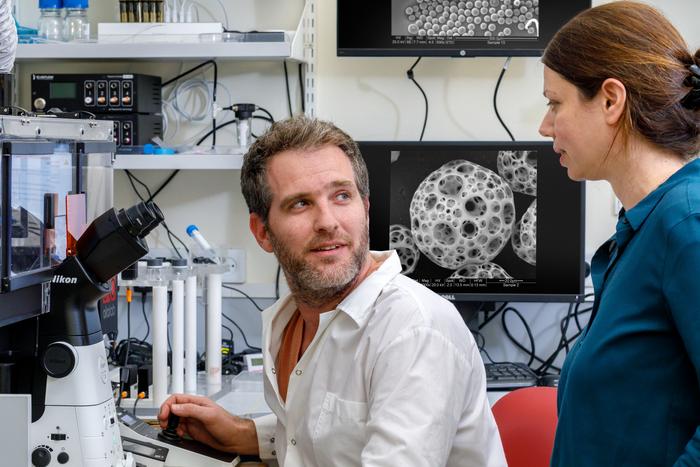A recent study has introduced a novel method combining nano informatics and machine learning to precisely predict cancer cell behaviors, enabling the identification of cell subpopulations with distinct characteristics like drug sensitivity and metastatic potential. This research could transform cancer diagnosis and treatment, enhancing personalized medicine by facilitating rapid and accurate testing of cancer cell behaviors from patient biopsies and potentially leading to the development of new clinical tests to monitor disease progression and treatment effectiveness.

Credit: Yoram Aschheim
A recent study has introduced a novel method combining nano informatics and machine learning to precisely predict cancer cell behaviors, enabling the identification of cell subpopulations with distinct characteristics like drug sensitivity and metastatic potential. This research could transform cancer diagnosis and treatment, enhancing personalized medicine by facilitating rapid and accurate testing of cancer cell behaviors from patient biopsies and potentially leading to the development of new clinical tests to monitor disease progression and treatment effectiveness.
In an important advance in the fight against cancer, a research team from The Hebrew University has developed a new method to predict the behavior of cancer cells with high accuracy. This innovative approach, combining nano informatics and machine learning, could revolutionize the diagnosis and treatment of cancer by allowing for the rapid identification of cancer cell subpopulations with varying biological behaviors.
In a novel study led by doctoral student Yoel Goldstein and Prof. Ofra Benny from the School of Pharmacy in the Faculty of Medicine, in collaboration with Prof. Tommy Kaplan, Head of the Department of Computational Biology at the School of Engineering and Computer Science at Hebrew University, The Hebrew University, an innovative method was developed to predict cancer cell behavior using nano informatics and machine learning. This discovery may lead to a significant breakthrough in cancer diagnosis and treatment, enabling the identification of cancer cell subpopulations with different characteristics through simple and quick tests.
The initial phase of the study involved exposing cancer cells to particles of various sizes, each identified by a unique color. Subsequently, the precise amount of particles consumed by each cell was quantified. Machine learning algorithms then analyzed these uptake patterns to predict critical cell behaviors, such as drug sensitivity and metastatic potential.
“Our method is novel in its ability to distinguish between cancer cells that appear identical but behave differently at a biological level,” Yoel Goldstein elaborated and explained “This precision is achieved through algorithmic analysis of how micro and nanoparticles are absorbed by cells. Being capable to collect and analyze new types of data brings up new possibilities for the field, with the potential to revolutionize clinical treatment and diagnosis through the development of new tools.”
The research has paved the way for new types of clinical tests that could significantly impact patient care. “This discovery allows us to potentially use cells from patient biopsies to quickly predict disease progression or chemotherapy resistance,” stated Prof. Benny. “It could also lead to the development of innovative blood tests that assess the efficacy of targeted immunotherapy treatments as example.”
Current tools for predicting and detecting cancer often lack accuracy and efficiency. Traditional methods like imaging scans and tissue biopsies can be invasive, costly, and time-consuming, leading to delays in treatment and potential misdiagnoses. These approaches may not capture the dynamic nature of cancer progression and can result in limited insights into the disease’s behavior at a cellular level. Consequently, patients may experience delays in diagnosis, suboptimal treatment outcomes, and increased psychological distress. This highlights the urgent need for more effective and non-invasive diagnostic tools, like the recent breakthrough achieved by researchers at The Hebrew University, which represent a significant advancement in personalized medicine, providing hope for more effective and customized treatment strategies for cancer patients.
Journal
Science Advances
Method of Research
Experimental study
Subject of Research
People
Article Title
Particle uptake in cancer cells can predict malignancy and drug resistance using machine learning
Article Publication Date
29-May-2024



